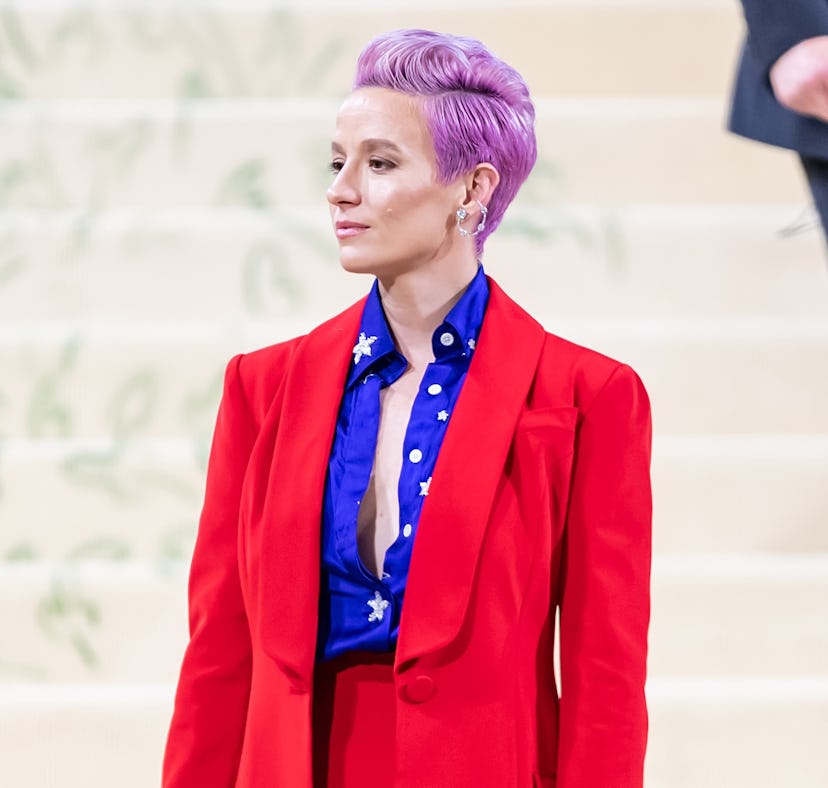
Megan Rapinoe Called Out Mitch McConnell's Tweet About Ketanji Brown Jackson
“This is so gross.”
Even though Supreme Court nominee Ketanji Brown Jackson’s Senate confirmation hearings ended on March 24, some people are seriously fed up with the way Jackson was treated throughout the hearings — including soccer star Megan Rapinoe. After Sen. Mitch McConnell of Kentucky, the Republican minority leader in the Senate, tweeted he would not be voting to confirm Jackson to the Supreme Court, Rapinoe called out the senator for his support of Brett Kavanaugh during his controversial Supreme Court hearing in 2018, and addressed what she says his refusal to elect Jackson actually means. If you think there’s a chance the senator may change his mind, Megan Rapinoe’s tweet about Mitch McConnell and Ketanji Brown Jackson says it all.
On March 24, McConnell took to Twitter to release a statement saying he “cannot and will not support” Supreme Court nominee Judge Ketanji Brown Jackson “for a lifetime appointment to our highest court,” citing Jackson’s record and “performance this week” as the reasons why. It’s a pretty lame excuse, considering she’s held five different roles with the U.S. legal system, including public defender, district judge, and judge for the U.S. Court of Appeals for the District of Columbia Circuit. As The Washington Post pointed out, this experience makes her more qualified than any sitting member of the court. Luckily, Megan Rapinoe — who is no stranger to speaking out about her political beliefs — saw right through his sentiments and responded to the minority leader’s flagrant display of double standards in a quote tweet, writing, “Your dude couldn’t even answer questions about beer.”
Rapinoe finished off her clap back tweet by calling out McConnell’s real reason for refusing to elect Jackson, writing, “You couldn’t possibly yell ‘it’s because she’s a Black woman’ any louder. This is so gross.”
Jackson would be the first Black woman to sit on the Supreme Court, and, surprise surprise, her confirmation process has been troubling. Through her process, Jackson has had to face racist and sexist lines of questioning, bad-faith questions about her credentials, and suggestions that her record shows her to be incompetent or immoral. At the same time, Jackson has the highest approval ratings of any Supreme Court nominee in 35 years, according to a Gallup poll. Many of those watching the four days of her hearings called out her treatment as racist, sexist, or both, particularly as compared to previous confirmation hearings.
It’s that comparison that clearly troubled Rapinoe — the “dude” she referred to was Supreme Court Justice Brett Kavanaugh, who famously lashed out during his confirmation hearing with the Senate Judiciary Committee in 2018. Kavanaugh’s hearing was an exceptionally bad one, and included Christine Blasey Ford’s harrowing recount of Kavanaugh’s alleged attempt to sexually assault her in 1980s (Kavanaugh denied her allegations), and Kavanaugh’s famous defense of beer as part of his rebuttal of Blasey Ford’s allegations. Still, McConnell’s support for the nominee never wavered. McConnell even went so far as to call Kavanaugh “one of most qualified and most impressive Supreme Court nominees in our nation’s history” on October 1, 2018, and referred to Kavanaugh’s hearing responses as “thoughtful” and “expansive.”
Of course, McConnell’s history with controversial Supreme Court nominees is, uh, thorough. Back in 2016, McConnell threw his support behind President Trump’s SCOTUS nominee Neil Gorsuch: The push for Gorsuch came after McConnell spent 11 months stonewalling Barack Obama’s nominee, Merrick Garland, claiming that new justices shouldn’t be confirmed in an election year.
But fast forward four years, and McConnell managed to expedite the confirmation of Justice Amy Coney Barrett in 2020, just before that year’s election. Barrett was confirmed to the lifelong position exactly 30 days after her nomination announcement, and eight days before Election Day on Nov. 3. (His rationale at the time was that it didn’t count this time, because Trump was running for re-election.) Noticing a pattern yet?
I guess at least this time, McConnell just said “no” without trying to justify it. It’s almost a shame — who knows what he might have come up with this time.